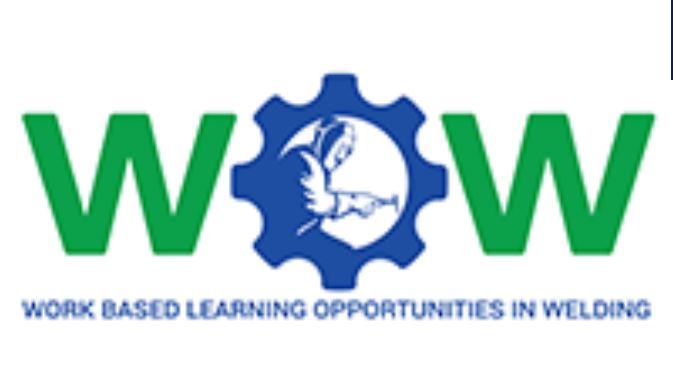Bringing welding learning opportunities into the shop floor — European Federation Welding, Joining and Cutting
The Work-based Learning Opportunities in Welding (WOW) project connects trainees learning requirements, vocational education and training organizations and the manufacturing companies that needs them

WoW_Logo
PORTO SALVO, Portugal – May 2, 2018 – PRLog — There was never a more exciting time to work in manufacturing, as the pace of innovation is accelerating, and companies need to quickly transform their production methods by, among other, integrating leading-edge technological breakthroughs, from additive manufacturing and sophisticated welding technologies to fast prototyping and endless production runs.
These changes put a strain on workforce flexibility and knowledge requirements, as professionals need to be qualified in order to swiftly and regularly adapt to new technologies. Additionally, manufacturing companies throughout Europe are struggling to find candidates for shop floor positions, as young people still view manufacturing and welding as non-technological and physically demanding jobs.
Leveraging the combined knowledge of the project’s partners, the Work-based Learning Opportunities in Welding (WOW) aims to address the aforementioned challenges, by developing a work-based learning system for the manufacturing sector, supported by a local and European cooperative structure involving the European Federation of Welding, Joining and Cutting (EWF), Authorised Nominated Bodies (ANBs) for qualification, Vocational Educational, Training providers (Authorized Training Bodies – ATBs), companies and learners. The project will define a Quality Assurance Structure as well as operating procedures to put Work-Based Learning in place for the welding sector.
As it has already been highlighted on reports from other projects currently underway (MAKE IT, which aims at developing a harmonized European System for Recognition and Validation of Competencies in Welding Sector), there is clearly a shortage of apprenticeships within the European Welding Practitioner (EWP) and the Welding Specialist (EWS) qualifications. Both EWP and EWS are core profiles, which have awarded around 20.000 diplomas in 33 countries. WOW aims to set the necessary requirements for apprenticeships and in company-training to be recognised at European level, as well as at national and possibly regional level. A pilot project will start in the United Kingdom, as it has the most advanced system to qualify students and bring them into the workforce of all the participating countries, with the project expected to reach 33 European countries and more than 1,000 vocational training schools (Authorized Training Bodies) to ensure the spread of its results.
This project comes at a juncture in time when welding professionals are scarce and highly required and youth unemployment in the participating countries is high (Spain 48.3%, Italy 40.3%, Portugal 32%, Romania 21.7%, Hungary 17.3% and United Kingdom 14.6%), highlighting the need to establish and develop VET-business partnerships on apprenticeships. These would allow maintaining the industry competitiveness and captivate younger generations into the manufacturing sector. However, to do that, the actual training needs to be in line with information usage patterns of younger generations, including workshops and IT tools. The latter will also address the requirements of the distributed nature of the project, for which an online platform/application will be developed for the triangle (trainee/apprentice, VET and company/factory)
EWF’s unique Quality Assurance System, a pillar of the project’s success
The project will develop a Quality Assurance Structure as well as operating procedures, to put work-based learning in place for the welding sector. In order to achieve that, stakeholders need to be empowered with the capacities required to deliver work-based learning at the individual, organisational and sectoral level. This process will be undertaken with the direct participation of in-company trainers, mentors, apprentices/
this knowledge transfer activity is to place the focus at the individual (learner), organisational (companies) and sectoral (partnership)
This will be achieved by leveraging the uniqueness of EWF’s Quality Assurance System, which is successfully deployed in 33 countries. This system includes assessment, validation and award of the qualification underpinning by rigorous quality regime which ensures the required standards are met uniformly throughout the world. This Quality process is controlled by the EWF and implemented through Authorized Nominated Bodies, with each ANB specialised in a specific scope and complying with the EWF quality assurance system. The delivery of courses, leading to the international qualifications, is performed by Authorized Training Bodies, which are approved at national level by the ANBs.
Since its inception, EWF has been continuously improving its qualifications and enhancing its quality assurance mechanism, ensuring that qualifications and
certifications awarded across borders, in the member countries, meet the standards expected and are aligned with the requirements of industry.
Tackling today the welding challenges of tomorrow
Based on the requirements of industry but also of the trainees, it has become increasingly obvious that WBL strategies needed to be introduced into the welding coordination-
referenced in the EWF strategy which is aligned with the European Commission priorities.
The project aims to introduce models of WBL, namely
1) alternance schemes/ “dual system” and
2) “on-the-job training periods” in companies and/or industrial environments in the EWP and in the European Welding Specialist (EWS) qualifications, according to accredited European tools, such as European Qualification Framework, Learning Objectives approach, and the European Credit System for Vocational Education and Training (ECVET). This action is of the utmost importance, in order to guarantee that WBL will be fully accepted in the EWF system and aligned with the work that has been done in other projects (Rainbow and ManuMobile) to integrate these tools at a European level.
Project Partners
The project members comprises 7 organizations, including EWF (European Federation for Welding, Joining and Cutting, TWI (The Welding Insitute), ISQ (Instituto de Soldadura e Qualidade), ISIM (Institutul National de Cercetare Dezvoltare in Sudura si Incercari de Materiale Timisoara), CESOL (Associación Española de Soldaduta e Tecnologias de Unión), MHtE (Magyar Hegesztéstechnikai és anyagvizsgálati Egyesülés ) and IIS (Istituto Italiano della Saldatura).
http://www.ewf.be/
http://www.woweldingproject.eu/
EWF – European Federation of Welding
Joining and Cutting
***@isq.pt




